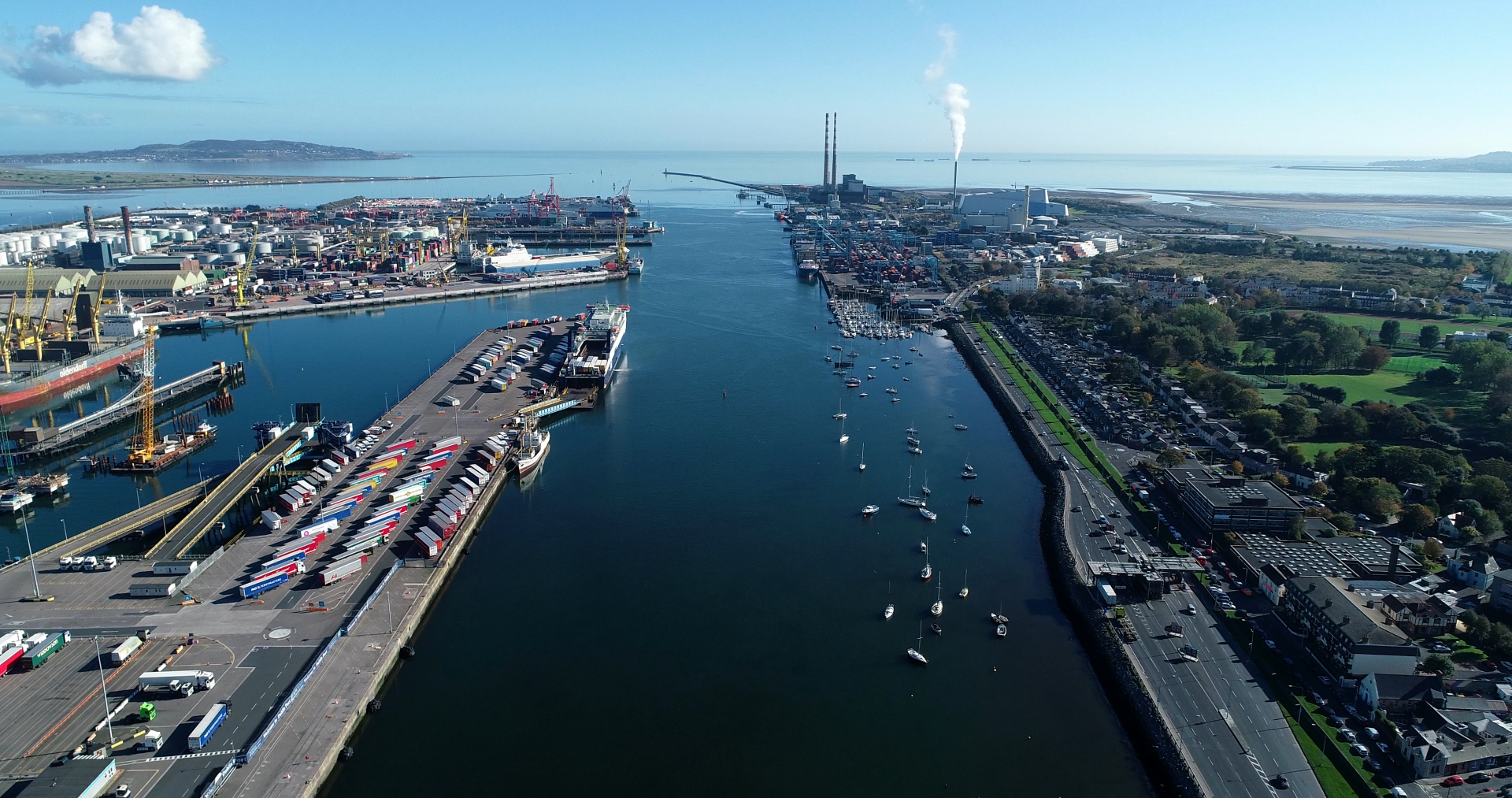Dublin Port publishes Post 2040 Dialogue papers

30 November 2020
DPC invites alternative views on challenge to deliver post-2040 port capacity
Dublin Port Company has today published the seventh and final instalment in a series of new discussion papers called Dublin Port Post 2040 Dialogue: https://www.dublinportpost2040dialogue.ie/
Through the papers, DPC seeks to explain and contextualise the challenges ahead in planning the long-term delivery of port capacity to meet future demand on the east coast of Ireland by 2040, or sooner.
The views expressed in the papers are based on the implicit acceptance of the development path set out in Masterplan 2040 to continue to develop Dublin Port where it is until it reaches its full capacity (77 million gross tonnes per annum) and to continue to operate this capacity long after 2040.
The concluding paper on “Options for the greenfield development of additional east coast port capacity” sets out the nature and scale of the development challenge if the targets of Masterplan 2040 are not attained and if additional capacity is not provided in other east coast ports, assuming current DPC growth projections come to pass.
This would mean building a new port at a greenfield site on the east coast of Ireland ready for operation in just 20 years’ time by 2040. DPC estimates that a new port, referred to as DP1.5, would cost in the region of €3.9 billion – €4.2 billion to construct (at 2020 prices), assuming the extreme challenges of financing and securing the necessary consents to deliver a project of this magnitude, or “megaproject” could even be achieved.
In analysing the issues covered by the papers, DPC has reached six key conclusions:
- Dublin Port Company must complete all of the projects outlined in Masterplan 2040 to deliver infrastructure with an annual throughput capacity of 77 million gross tonnes by 2040.
- Critically, this will require planning permission to be secured for the third and final Masterplan Project, known as the 3FM Project.
- The achievement of a throughput of 77 million gross tonnes per annum by 2040 will require not only the completion of all of the infrastructure projects in Masterplan 2040; it will also require that the efficiency of port operations greatly increases so that port infrastructure is utilised to its maximum. This will require the elimination of systemic inefficiencies in existing supply chain operations.
- Over the next 20 years, additional capacity at other existing east coast ports will be required so that, as Dublin Port approaches its ultimate capacity, volumes which Dublin cannot handle can be accommodated elsewhere.
- During these 20 years, DPC will need to work on the DP1.5 project so that it can be brought through the planning process and construction started by about 2033 should that become necessary.
- The projects to provide additional capacity in other ports and the project to construct DP1.5 can only be realised with State support – none of the projects and none of the port companies (including DPC) are capable of raising the project finance that would be required.
Underpinning the views expressed in the papers is more than a decade’s worth of knowledge, expertise, scientific and environmental data acquired within DPC through the delivery of major infrastructure projects in Dublin Port.
Alternative Viewpoints
However, DPC recognises that alternative viewpoints exist including a long-held view that Dublin Port should be moved from its current location, something DPC has consistently rejected over the years.
The purpose, therefore, of publishing the Dublin Port Post 2040 Dialogue papers is to initiate and facilitate informed discussion and substantive engagement with DPC on key questions that require answers at this pivotal moment for the company, namely:
- What level of port capacity will have to be provided to meet future demand on the east coast of Ireland over the next 20 years?
- Where will this additional capacity be provided?
- How will the projects needed to deliver this additional capacity be financed?
Opportunity for Dialogue
Open to anyone with an interest in the long-term planning and development of both the Port and the City, DPC through its Dublin Port Post 2040 Dialogue invites those who wish to challenge its thinking and development path to date to respond and share their thoughts in writing.
Anyone who would like to be a part of this dialogue, can send their considered ideas, and the rationale for their alternative viewpoints to post2040@dublinport.ie and DPC will publish these online alongside the papers containing DPC’s views.
The different ideas and submissions will form the basis for discussion and debate during 2021. DPC will return to this in Q1 2021 once the combined pressures of Brexit and Covid-19 have subsided.
Eamonn O’Reilly, Chief Executive, Dublin Port Company, said: “While DPC is continuing to develop Dublin Port over the remaining 20 years of Masterplan 2040, we also need to plan for how, when and where additional port capacity might be provided on the east coast of Ireland by 2040, if not sooner.
“We know from experience that twenty years is a relatively short period of time in the context of delivering large scale infrastructure projects, let alone a once in 200 years megaproject. It is, therefore, vital that we begin to plan now, so that long-term development of essential port infrastructure can continue to take place in a timely, sustainable fashion.
“That undoubtedly requires a mix of views and inputs, which is what the Dublin Port Post 2040 Dialogue is designed to facilitate. This is everyone’s opportunity to help answer important questions in the national interest about the environmental, planning and financial challenges that lie ahead.
“In the same way, DPC will continue to put forward its views on development plans and policies in the coming year, using the six conclusions from this series of papers to inform, among others, DPC’s contribution during 2021 to the preparation of the next Dublin City Development Plan.”
